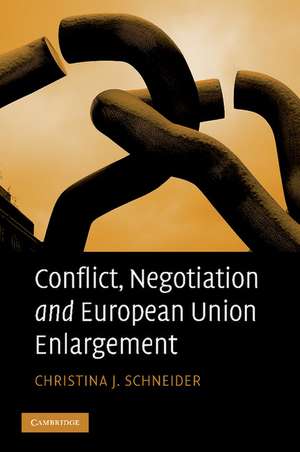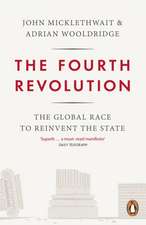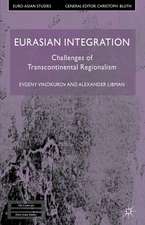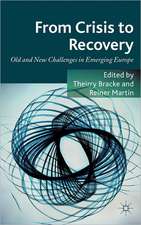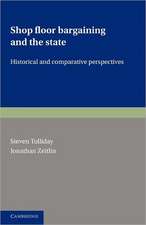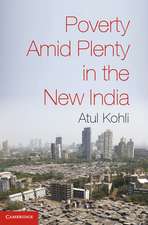Conflict, Negotiation and European Union Enlargement
Autor Christina J. Schneideren Limba Engleză Paperback – 9 mai 2012
| Toate formatele și edițiile | Preț | Express |
|---|---|---|
| Paperback (1) | 281.67 lei 6-8 săpt. | |
| Cambridge University Press – 9 mai 2012 | 281.67 lei 6-8 săpt. | |
| Hardback (1) | 524.98 lei 6-8 săpt. | |
| Cambridge University Press – 10 dec 2008 | 524.98 lei 6-8 săpt. |
Preț: 281.67 lei
Nou
Puncte Express: 423
Preț estimativ în valută:
53.90€ • 56.42$ • 44.60£
53.90€ • 56.42$ • 44.60£
Carte tipărită la comandă
Livrare economică 05-19 aprilie
Preluare comenzi: 021 569.72.76
Specificații
ISBN-13: 9781107404427
ISBN-10: 1107404428
Pagini: 228
Ilustrații: black & white illustrations
Dimensiuni: 152 x 229 x 12 mm
Greutate: 0.31 kg
Editura: Cambridge University Press
Colecția Cambridge University Press
Locul publicării:New York, United States
ISBN-10: 1107404428
Pagini: 228
Ilustrații: black & white illustrations
Dimensiuni: 152 x 229 x 12 mm
Greutate: 0.31 kg
Editura: Cambridge University Press
Colecția Cambridge University Press
Locul publicării:New York, United States
Cuprins
List of illustrations; List of tables; List of acronyms; Acknowledgements; 1. Introduction; 2. EU enlargements and transitional periods; 3. A rationalist puzzle of EU enlargement?; 4. A theory of discriminatory membership; 5. EU enlargement, distributional conflicts, and the demand for compensation; 6. The discriminatory of membership; 7. Discriminatory membership and intra-union redistribution; 8. Conclusion; Bibliography; Index.
Recenzii
“Christina Schneider’s study of the process and outcomes of EU accession is a model of modern political economy research. By combining quantitative and qualitative methods with a rigorous theoretical approach grounded in the analysis of distributional conflict, she provides a thoroughly convincing account of the sources and dimensions of differentiated integration.”
Lisa L. Martin, Weatherhead Center for International Affairs, Harvard University
“Rational choice approaches cannot explain the dynamics of EU integration and especially EU enlargement – so they say. Schneider’s book consigns this statement to the realms of fantasy. She forcefully demonstrates that the contrary is true: EU enlargement leads to distributional conflicts which are only predicted by rationalist approaches to EU integration. This volume is an essential reading for anyone interested in political integration and international conflict.”
Thomas Plümper, University of Essex
“Christina Schneider’s analysis of distributional bargaining and discrimination adds a missing piece to the enlargement puzzle. A major step ahead in theorizing the expansion of the European Union.”
Frank Schimmelfennig, Center for Comparative and International Studies, ETH Zurich
“Christina Schneider has written a remarkably wide-ranging and analytically deep and compelling analysis of EU enlargement. Carefully dissecting the many and complex distributional battles involved in successive enlargement rounds and pondering their implications, her work stands out as one of the best studies on a central aspect of European integration – methodologically sophisticated, thorough, and original.”
Walter Mattli, Professor of International Political Economy, Oxford University
Lisa L. Martin, Weatherhead Center for International Affairs, Harvard University
“Rational choice approaches cannot explain the dynamics of EU integration and especially EU enlargement – so they say. Schneider’s book consigns this statement to the realms of fantasy. She forcefully demonstrates that the contrary is true: EU enlargement leads to distributional conflicts which are only predicted by rationalist approaches to EU integration. This volume is an essential reading for anyone interested in political integration and international conflict.”
Thomas Plümper, University of Essex
“Christina Schneider’s analysis of distributional bargaining and discrimination adds a missing piece to the enlargement puzzle. A major step ahead in theorizing the expansion of the European Union.”
Frank Schimmelfennig, Center for Comparative and International Studies, ETH Zurich
“Christina Schneider has written a remarkably wide-ranging and analytically deep and compelling analysis of EU enlargement. Carefully dissecting the many and complex distributional battles involved in successive enlargement rounds and pondering their implications, her work stands out as one of the best studies on a central aspect of European integration – methodologically sophisticated, thorough, and original.”
Walter Mattli, Professor of International Political Economy, Oxford University
Notă biografică
Descriere
This book argues on EU enlargement looks at how EU members and applicant states negotiate enlargement benefits and costs.
